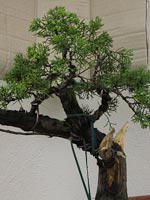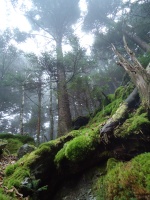We can all learn something here..
+10
appalachianOwl
-keith-
rockm
jgeanangel
coh
PaulH
Khaimraj Seepersad
Sakaki
Rick36
leatherback
14 posters
Page 1 of 2
Page 1 of 2 • 1, 2 
 We can all learn something here..
We can all learn something here..
Especially from 1:30 onwards it gets really good. The new way of doing bonsai. 
{Note: not to be taken too seriously. Personally, I think this is the way NOT to go}
{Note: not to be taken too seriously. Personally, I think this is the way NOT to go}
Last edited by leatherback on Thu Nov 29, 2012 12:38 pm; edited 1 time in total (Reason for editing : disclaimer)

leatherback- Member
 Re: We can all learn something here..
Re: We can all learn something here..
Leatherback - you have a dry wit - I think! Hope no newbies take your recommendation seriously - I just wasted ten minutes of my life. The great thing is the quality of the video - nearly as good as the method! Cheers.
Rick36- Member
 Re: We can all learn something here..
Re: We can all learn something here..
I dont really have any problem with this...have you seen the actual 'things' he calls 'bonsai'? That is 3 plants put in a bonsaipot, so i dont mind if he used a steak or bread knife to simply cut off a slice of roots 
and whats more i've seen a very famous bonsai artist do the same with a real bonsai... i wont tell who
 . And thats ok too, because you only do such a thing if you know your tree inside and out, that includes how the roots are developed, how they are spread, where you would touch the thick roots etcetera. That way, you know when you hurt the tree or not. Sure dont use a rough edged cutting knife like this guy did or you'll make 'tearing' wounds that heal worse than cleanly 'sliced' roots. Offcourse every once in a while you would have to do a 'normal' rootpruning and repotting too, that is clean it all out, renew other parts, fill with new soil etc. So no, I certainly would not suggest this is a practice that you can carry out with every repot, or with every tree at any stage.
. And thats ok too, because you only do such a thing if you know your tree inside and out, that includes how the roots are developed, how they are spread, where you would touch the thick roots etcetera. That way, you know when you hurt the tree or not. Sure dont use a rough edged cutting knife like this guy did or you'll make 'tearing' wounds that heal worse than cleanly 'sliced' roots. Offcourse every once in a while you would have to do a 'normal' rootpruning and repotting too, that is clean it all out, renew other parts, fill with new soil etc. So no, I certainly would not suggest this is a practice that you can carry out with every repot, or with every tree at any stage.
cheers
PS: no i dont use this method
and whats more i've seen a very famous bonsai artist do the same with a real bonsai... i wont tell who
cheers
PS: no i dont use this method
Guest- Guest
 Re: We can all learn something here..
Re: We can all learn something here..
Rick36 wrote:L. - Good edit. Cheers.

Ahahaha
This is the weirdest repotting I've ever seen

Sakaki- Member
 Re: We can all learn something here..
Re: We can all learn something here..
Leatherback,
in the interest of just doing. I grew a serissa, in the moss we get from our cocoa trees. It did well and the moss after a year had not decomposed in anyway.
I have left images of the experiment and the plant on the IBC, if you have to see.
I will test the idea again this year, but with a look at long term results, say 5 to 10 years. Probably grow another serissa or maybe a tamarind.
The appeal is the ease of planting.
Of course if you also just used sifted crushed red earthenware brick or sifted silica builder's gravel as single ingredients, there would be ease of planting as well.
In fact I have a tamarind growing in pure sifted resembles akadama stone for the last 3 or 4 years. I just leave the cut leaves from the tamarind to reform the organic part. Thus far works well.
Papaya - paw paw as we call it, has very soft roots and a hole in the tree usually leads to death. How do you prune it ?
Later.
Khaimraj
in the interest of just doing. I grew a serissa, in the moss we get from our cocoa trees. It did well and the moss after a year had not decomposed in anyway.
I have left images of the experiment and the plant on the IBC, if you have to see.
I will test the idea again this year, but with a look at long term results, say 5 to 10 years. Probably grow another serissa or maybe a tamarind.
The appeal is the ease of planting.
Of course if you also just used sifted crushed red earthenware brick or sifted silica builder's gravel as single ingredients, there would be ease of planting as well.
In fact I have a tamarind growing in pure sifted resembles akadama stone for the last 3 or 4 years. I just leave the cut leaves from the tamarind to reform the organic part. Thus far works well.
Papaya - paw paw as we call it, has very soft roots and a hole in the tree usually leads to death. How do you prune it ?
Later.
Khaimraj

Khaimraj Seepersad- Member
 Re: We can all learn something here..
Re: We can all learn something here..
PaulH wrote:Hilarious!
This is The bonsai world's version of the Red Green show.
http://www.redgreen.com/
Except that this guys seems serioius about it!

leatherback- Member
 Re: We can all learn something here..
Re: We can all learn something here..
And is a published author on the subject! There's hope for all of us yet.
Apparently he is/was a podiatrist, but I think he's put his foot in it this time.
Apparently he is/was a podiatrist, but I think he's put his foot in it this time.
Rick36- Member
 Re: We can all learn something here..
Re: We can all learn something here..
Maybe. But if you do not mind.. I will not aim that high. Being a published author on Papaya-in-moss bonsai! Pooh..

leatherback- Member
 Re: We can all learn something here..
Re: We can all learn something here..
He certainly marches to the beat of his own drum, doesn't he? That "bottle cap" bonsai is a great idea!
Question is, should I go out and invest in sphagnum moss futures? Is this the next big thing?
Question is, should I go out and invest in sphagnum moss futures? Is this the next big thing?

coh- Member
 Deja Vu
Deja Vu
Sure seems like I have read this before???
from 2009...http://bonsainut.com/forums/showthread.php?2341-For-my-first-post!
Scroll to post #8 (by rockm) and you will read about the original sphagnum moss bonsai king and his sad fate.
John
from 2009...http://bonsainut.com/forums/showthread.php?2341-For-my-first-post!
Scroll to post #8 (by rockm) and you will read about the original sphagnum moss bonsai king and his sad fate.
John
jgeanangel- Member
 Re: We can all learn something here..
Re: We can all learn something here..
Those if us who were doing bonsai in the early-mid 90's probably saw Brian Batchelder's "New Horizons in Bonsai" program on public television. It ran here in N. Virginia on the local PBS station. This is almost exactly what was done in those programs, with the exception of the dull knife and sloppy application of the moss. He tightly packed the root zone with moss, working it with chopsticks like regular soil.
He claimed exceptional results (he lived in Fla.) using the method with tropicals, but said it won't work very well in temperate zones where it freezes, as the moss can turn into mush.
He claimed exceptional results (he lived in Fla.) using the method with tropicals, but said it won't work very well in temperate zones where it freezes, as the moss can turn into mush.
rockm- Member
 Re: We can all learn something here..
Re: We can all learn something here..
rockm wrote:Those if us who were doing bonsai in the early-mid 90's probably saw Brian Batchelder's "New Horizons in Bonsai" program on public television.
You had a TV show on Bonsai? Never realized that bonsai were such a big thing in USA that they made TV shows on it!

leatherback- Member
 Re: We can all learn something here..
Re: We can all learn something here..
ha ha i think ive watched most of this guys videos i would FF them to see what he would massacre next . there is a good one on airlayering too 

-keith-- Member
 Re: We can all learn something here..
Re: We can all learn something here..
Fascinating, as not one has even tried the idea to see if it works.
Chuckle, I have watched most of those 120 or so episodes, repeats itself and the trees never get to any real state of refinement.
However, I do wonder if the original source of akadama, wasn't a very durable material, as I have seen folk talking about a very hard material from the old days. The batch I got for testing had to be fired to get it hard enough for use, and even then some of it seemed to be broken bonds and subject to shattering.
It wouldn't take much to jump from akadama to volcanic material,and then the use of well rotted organic balls of meal.
Especially if one were looking for a way to slow growth, but still keep the tree healthy, and in the same design for say a few years.
Perhaps what the Doctor has followed on is an idea if used correctly for keeping Bonsai healthy and in stasis of a time period?
BUT then would this be for ultra refinement and not beginner or middle stage Bonsai ?
Just more questions.
Later.
Khaimraj
Chuckle, I have watched most of those 120 or so episodes, repeats itself and the trees never get to any real state of refinement.
However, I do wonder if the original source of akadama, wasn't a very durable material, as I have seen folk talking about a very hard material from the old days. The batch I got for testing had to be fired to get it hard enough for use, and even then some of it seemed to be broken bonds and subject to shattering.
It wouldn't take much to jump from akadama to volcanic material,and then the use of well rotted organic balls of meal.
Especially if one were looking for a way to slow growth, but still keep the tree healthy, and in the same design for say a few years.
Perhaps what the Doctor has followed on is an idea if used correctly for keeping Bonsai healthy and in stasis of a time period?
BUT then would this be for ultra refinement and not beginner or middle stage Bonsai ?
Just more questions.
Later.
Khaimraj

Khaimraj Seepersad- Member
 Re: We can all learn something here..
Re: We can all learn something here..
Khaimraj Seepersad wrote:Fascinating, as not one has even tried the idea to see if it works.
Chuckle, I have watched most of those 120 or so episodes, repeats itself and the trees never get to any real state of refinement.
However, I do wonder if the original source of akadama, wasn't a very durable material, as I have seen folk talking about a very hard material from the old days. The batch I got for testing had to be fired to get it hard enough for use, and even then some of it seemed to be broken bonds and subject to shattering.
It wouldn't take much to jump from akadama to volcanic material,and then the use of well rotted organic balls of meal.
Especially if one were looking for a way to slow growth, but still keep the tree healthy, and in the same design for say a few years.
Perhaps what the Doctor has followed on is an idea if used correctly for keeping Bonsai healthy and in stasis of a time period?
BUT then would this be for ultra refinement and not beginner or middle stage Bonsai ?
Just more questions.
Later.
Khaimraj
Papaya plant is not a tree, It has a shorter life span than tree. This means his method of sphagnum moss as medium for "soil" is definitely valid.
In fact (as Khaimraj has stated), Sphagnum moss can be used too with fast root growing trees that can be repoted in one season or two, I am also mixing some soil medium with half sphagnum moss in some of my regular trees.
I find his video informative and I think the guy is not a "newbie" and knows his stuff more than most people here giving advice on what to do with trees of other people.
One thing I don't agree with this video is the papaya and some other plant being called as bonsai.
regards,
jun
Guest- Guest
 Re: We can all learn something here..
Re: We can all learn something here..
people are wild, stumbled across video of a guy claiming that with good luck and proper care bonsai can live upwards of 20 to 30 years

appalachianOwl- Member
 Re: We can all learn something here..
Re: We can all learn something here..
"Fascinating, as not one has even tried the idea to see if it works."
It has been tried. Do a search on "New Horizons in Bonsai" and "Brian Batchelder"
Batchelder wrote and produced almost a dozen episodes for a syndicated American TV show in 1990 or so on this very thing. He eventually died of an infection that he got from the moss...
It has been tried. Do a search on "New Horizons in Bonsai" and "Brian Batchelder"
Batchelder wrote and produced almost a dozen episodes for a syndicated American TV show in 1990 or so on this very thing. He eventually died of an infection that he got from the moss...
rockm- Member
 Re: We can all learn something here..
Re: We can all learn something here..
Rockm,
I meant the chaps writing here. They are, for guys so young, so very negative.
I think from further reading, that the guy had some sort of compromised immunity system. It seems that most folk get some sort of nodules [ I am not a doctor, my brother is and this is memory I am writing, so I stand to b corrected.] from sphagnum peat moss. I do wonder if when the material has been sterilised by steam, the problem re-arises?
Anyhow, it once again seems to be modified Hydroponics. A substance for spport and added on fertilizer.
However, if done as a porous stone with composted organic meal, it maybe the next stage for a mature Bonsai, where density of branchlet or leaf and health is more important.
Additionally, the stone would not allow mush at the core of the Bonsai, might make the pie wedge removal easier.
Anyhow, I decided a while ago to re-do the tests but for a long term. Perhaps two tests, our tree moss by itself and with added on porous stone.
I can see Jerry M. rolling his eyes heavenwards - chuckle - ahh for experiments and research.
Later.
Khaimraj
* How does it go - the idea, before the practice, became the distorted history.
I meant the chaps writing here. They are, for guys so young, so very negative.
I think from further reading, that the guy had some sort of compromised immunity system. It seems that most folk get some sort of nodules [ I am not a doctor, my brother is and this is memory I am writing, so I stand to b corrected.] from sphagnum peat moss. I do wonder if when the material has been sterilised by steam, the problem re-arises?
Anyhow, it once again seems to be modified Hydroponics. A substance for spport and added on fertilizer.
However, if done as a porous stone with composted organic meal, it maybe the next stage for a mature Bonsai, where density of branchlet or leaf and health is more important.
Additionally, the stone would not allow mush at the core of the Bonsai, might make the pie wedge removal easier.
Anyhow, I decided a while ago to re-do the tests but for a long term. Perhaps two tests, our tree moss by itself and with added on porous stone.
I can see Jerry M. rolling his eyes heavenwards - chuckle - ahh for experiments and research.
Later.
Khaimraj
* How does it go - the idea, before the practice, became the distorted history.

Khaimraj Seepersad- Member
 Re: We can all learn something here..
Re: We can all learn something here..
Sorry got confused...
FWIW, Batchelder's infection was very rare from what I've heard and probably came about from extremely long periods of exposure, like over six seven years of breathing the moss particles. There is still a slight chance someone who works with long-fibered sphagnum with their bare hands can get the sporotrichosis skin infection, which is as you say, a nodule-like growth. I try to use gloves when working with the stuff, but it's hit and miss...
FWIW, Batchelder's infection was very rare from what I've heard and probably came about from extremely long periods of exposure, like over six seven years of breathing the moss particles. There is still a slight chance someone who works with long-fibered sphagnum with their bare hands can get the sporotrichosis skin infection, which is as you say, a nodule-like growth. I try to use gloves when working with the stuff, but it's hit and miss...
rockm- Member
 Re: We can all learn something here..
Re: We can all learn something here..
Rules from oil painting and pottery - To All.
Dust = wear a dustmask.
Soil = use gloves
After working - bathe with an antiseptic soap.
Later.
Khaimraj
Dust = wear a dustmask.
Soil = use gloves
After working - bathe with an antiseptic soap.
Later.
Khaimraj

Khaimraj Seepersad- Member
 Re: We can all learn something here..
Re: We can all learn something here..
Also -------------- no eating / drinking in the work zone

Khaimraj Seepersad- Member
 Re: We can all learn something here..
Re: We can all learn something here..
Khaimraj Seepersad wrote:Also -------------- no eating / drinking in the work zone
Seriously, as said elsewhere, peat moss and long fiber sphagnum moss have a place, are very useful in specific situations. Long fiber sphagnum moss, I have experience with sphag, sourced from New Zealand and Chile. This moss has a fairly high phenol content, which is anti fungal and anti bacterial. This is why it was used as an adsorbent middle layer in making certain types of bandages up until shortly after WWII. It is a good short term media to use to put roots on suffering trees and other plants, often used in air layering. Quite useful.
Were one to really study the nuances of using long fiber moss, and get how firmly or how loosely to pack it in the pot, and how often repotting needs to occur, there is the possibility it could be a useful media. But judging by my experience using NZ sphagnum for my orchids, it is not a media I would ever recommend for a beginner. It does not last long, and the warmer your temperature and the more fertilizer you use the quicker it becomes anoxic muck. I also have experienced inconsistency from bale to bale, some will last (for my orchids) for maybe 8 months, then break down, some bales will last 2 years before breaking down in use. In bonsai I never really tried it for anything other than putting roots on cuttings or nearly completely rootless trunks.
For what it is worth.

Leo Schordje- Member
Page 1 of 2 • 1, 2 
 Similar topics
Similar topics» what do you see
» Live and learn...
» Chinese landscape
» The COLOUR - STONE ...
» trying to learn how to post images here...
» Live and learn...
» Chinese landscape
» The COLOUR - STONE ...
» trying to learn how to post images here...
Page 1 of 2
Permissions in this forum:
You cannot reply to topics in this forum|
|
|








